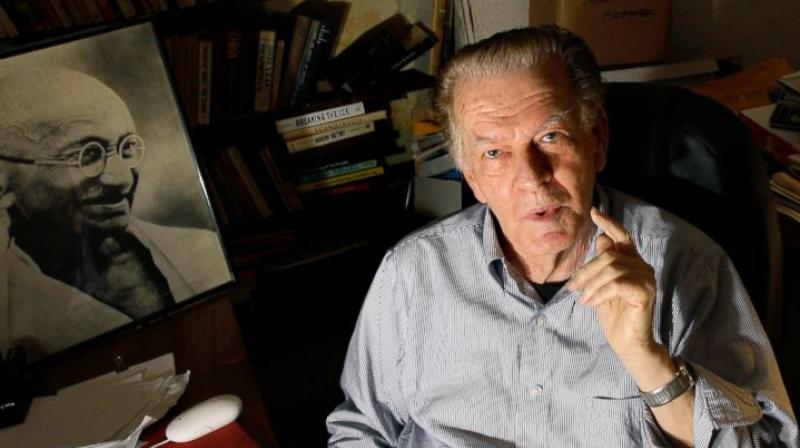The Politics of Gene Sharp
FEATURED RESEARCH PAPER, 29 Jun 2020
Brian Martin | Academia – TRANSCEND Media Service

Sharp founded the Albert Einstein Institution to advance the study and use of strategic nonviolent action as an alternative to violent conflict.
(Photo: AP)
Gene Sharp’s contributions to the understanding of nonviolent action provide a useful lens for understanding developments in the field in recent decades. Sharp built on Gandhi’s pioneering endeavours, but moved away from Gandhi by providing a pragmatic rationale for nonviolent action.
Three important contributions by Sharp are:
- his classification and cataloguing of methods of nonviolent action,
- his consent theory of power, and
- his framework for understanding nonviolent campaigns.
However, few academics have paid much attention to Sharp’s work, and policy-makers have largely ignored it. In contrast, activists have taken up Sharp’s ideas enthusiastically. Sharp is an imposing figure in the field of nonviolent action. Scholars and activists can learn from him, but also need to question and build on his ideas.
Sharp is the world’s foremost thinker on nonviolent action. Some nonviolence scholars regard him so highly that even the slightest criticism is resented. On the other hand, some left-wing critics paint him as a tool of US foreign policy. Meanwhile, few members of the public have even heard of him.
To read the Full Paper please download PDF file:
The Politics of Gene Sharp
________________________________________________
 Brian Martin is emeritus professor of social sciences at the University of Wollongong, Australia. He is the author of 20 books and hundreds of articles on nonviolence, whistleblowing, scientific controversies, information issues, democracy and other topics. He is vice president of Whistleblowers Australia and runs a large website on suppression of dissent (http://www.bmartin.cc/dissent/). His PhD is in theoretical physics from Sydney University. He has taught a wide range of subjects including communication studies, environmental issues, peace studies, the politics of technology, and happiness. He has undertaken many community research projects with the group Schweik Action Wollongong. CV: http://www.bmartin.cc/others/cv.html
Brian Martin is emeritus professor of social sciences at the University of Wollongong, Australia. He is the author of 20 books and hundreds of articles on nonviolence, whistleblowing, scientific controversies, information issues, democracy and other topics. He is vice president of Whistleblowers Australia and runs a large website on suppression of dissent (http://www.bmartin.cc/dissent/). His PhD is in theoretical physics from Sydney University. He has taught a wide range of subjects including communication studies, environmental issues, peace studies, the politics of technology, and happiness. He has undertaken many community research projects with the group Schweik Action Wollongong. CV: http://www.bmartin.cc/others/cv.html
Tags: Gandhi, Gene Sharp, Nonviolence, Nonviolent Action, Peace Research, Research
This article originally appeared on Transcend Media Service (TMS) on 29 Jun 2020.
Anticopyright: Editorials and articles originated on TMS may be freely reprinted, disseminated, translated and used as background material, provided an acknowledgement and link to the source, TMS: The Politics of Gene Sharp, is included. Thank you.
If you enjoyed this article, please donate to TMS to join the growing list of TMS Supporters.

This work is licensed under a CC BY-NC 4.0 License.
One Response to “The Politics of Gene Sharp”
Read more
Click here to go to the current weekly digest or pick another article:
FEATURED RESEARCH PAPER:
[…] Who Was Gene Sharp? What Were His Politics? Sharp was the world’s foremost thinker on nonviolent action. Some nonviolence scholars regard him so highly that even the slightest criticism is resented. On the other hand, some left-wing critics paint him as a tool of US foreign policy. Meanwhile, few members of the public have even heard of him. Read more>> […]